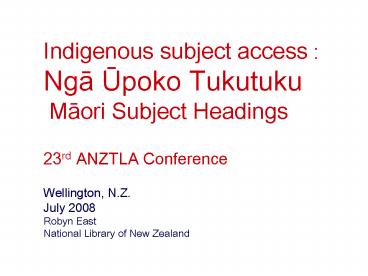Indigenous subject access : - PowerPoint PPT Presentation
1 / 31
Title:
Indigenous subject access :
Description:
Why has this thesaurus been developed? ... accessible for all the people of New Zealand ... ' Growth in Maori ... whanui rawa hoki te rere o enei korero i ... – PowerPoint PPT presentation
Number of Views:155
Avg rating:3.0/5.0
Title: Indigenous subject access :
1
Indigenous subject access Nga Upoko Tukutuku
Maori Subject Headings 23rd ANZTLA
Conference Wellington, N.Z. July 2008 Robyn
East National Library of New Zealand
2
3
- Why has this thesaurus been developed?
- Background history
- Concepts, methodology and construction
- Examples
- Application and development
4
- Why has this thesaurus been developed?
- Collecting, preserving, and protecting
- documents and making them
- accessible for all the people of New Zealand
- Growth in Maori language, from immersion
- schooling, leading to increased educational
literature - in te reo and increased library use by Maori
- To provide an appropriate pathway to
- indigenous knowledge
5
- Background history
- Te Ara Tika project reports
- 1993
- 1997
- 2004 survey
- National Forum on MSH 1998
- Maori Subject Headings project team 2005
- Authorisation from MARC Standards Office
- Launch 2006
- To provide an appropriate pathway to
- indigenous knowledge
6
NGA UPOKO TUKUTUKU
MAORI SUBJECT HEADINGS
http//mshupoko.natlib.govt.nz/mshupoko/
7
- Concepts and methodology
- Thesaurus name Nga Upoko Tukutuku
- Conceptual framework a Maori world view
- Thesaurus file structure retaining the
integrity of - a Maori world view
8
MAORI WORLDVIEW
Maori worldview is circular the people, the
environment and the mind are intrinsically
connected and related to each other
9
THE STRUCTURE
Tahuhu Broader term
Tukutuku Used for
Kaupapa Term
Reo a Iwi Dialect term
Kaho Related Term
Whakamarama
Scope note
Heke Narrower term
10
THE CONCEPT
TAHUHU Broader term
TE AO HOU CONTEMPORARY
WAIRUA
TUKUTUKU Used for
HINENGARO
KAHO Related term
TINANA
HEKE Narrower term
TE AO TAWHITO TRADITIONAL
11
(No Transcript)
12
(No Transcript)
13
(No Transcript)
14
(No Transcript)
15
Waka taua Whakamarama He waka mo te ope taua.
I tera rau tau, ka huri te tikanga hei hari I nga
tangata hoa. Scope note Richly carved large
waka/canoes traditionally used by war parties
ceremonial usage since early nineteenth
century. Tukutuku/Used for Pinaku Tararo
Waka pitau Waka toiera Waka whakarei English
Used for Canoes, War War canoes
Tahuhu/Broader Terms Waka Reo a iwi/Dialect
Term Whaka pitau
16
Whaka pitau Whakamarama Ngati Porou. Scope
Note Ngati Porou dialect for Waka
pitau. Titiro mai/Use Waka taua
17
Korero nehe Whakamarama Nga korero o
nehera. Scope note Stories of the
past. English Used for Ancient
stories History Stories, Ancient Tahuhu/Broader
Terms Korero
18
Tikanga Whakamarama Ko nga tikanga katoa a te
Maori. Ata tirohia te ahuatanga e rite ana. Kua
whanui rawa hoki te rere o enei korero i enei ra.
Scope note The correct and true way customs
and traditions that have been handed down through
time. Use as an additional subject heading when
any ritual or process, connected with a topic, is
being described, e.g. welcomes, funerals, canoe
traditions, war, education, arts. English Used
For Rites Rituals Customs Protocols
Ceremonies Traditions Processes Heke/Narrowe
r Terms Ahi ka Ahi marae Ahi tapu Aukati
Hahunga Niu Noa Ohaki Powhiri
Raupatu Rahui Tangihanga Tatau pounamu
Ta moko Tuku whenua Whakatau
mauri Kaho/Related Terms Hauora wairua
Karakia Take tikanga tangata Tikanga tuku
iho
19
Hekenga Whakamarama Te hekenga mai o nga waka
ki a Aotearoa. Scope note The migration of
people to New Zealand. English Used
For Migration Tahuhu/Broader
Terms Waka Tangata
20
(No Transcript)
21
(No Transcript)
22
(No Transcript)
23
(No Transcript)
24
(No Transcript)
25
(No Transcript)
26
(No Transcript)
27
(No Transcript)
28
(No Transcript)
29
(No Transcript)
30
Nga Upoko TukutukuImplementation and
developmentin the National Library
- All newly acquired published material is being
given Maori subject access where appropriate - All material in the collections is being given
Maori retrospective subject access where
appropriate - All material in te reo Maori published before
1900 is being given Maori subject access - Any gaps will be identified and more terms added
over time
31
(No Transcript)































